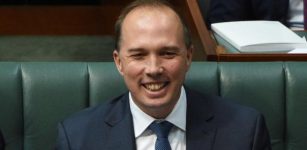Dutton’s Child Sex Offender Register Proposal Is Political Fodder

As the nation was still recovering from the holiday season, Australian home affairs minister Peter Dutton announced a proposal to establish a national public register of child sex offenders, which would make information about convicted criminals available online.
Describing it as “the toughest crackdown on paedophiles in Australia’s history”, Dutton told reporters on 8 January that the website would contain an offender’s name, date of birth, photo, the nature of their offending and their postcode.
“It would have a strong deterrent effect on offenders and ensure that parents are not in the dark about whether a registered sex offender has access to their children,” the minister said in a press release. “I have always fought for the protection of children and this is a battle that we must win.”
However, critics of the proposal point out that where public registers have been implemented elsewhere in the world, they’ve been shown to be ineffectual and public fear hasn’t been reduced. In fact, on occasion registers have led to public hysteria.
And it hasn’t been lost upon anyone that Dutton has come out swinging with this tough-on-crime measure right before a national election, in which his party looks set to suffer a serious defeat, and while he’s holding onto his own seat by a very slim margin.
Politically expedient
Civil Liberties Australia (CLA) chief executive Bill Rowlings told Sydney Criminal Lawyers that, “minister Peter Dutton is devaluing a most important and needed public debate – apparently for political purposes – about preventing child sex abuse.”
The fact that this proposal is a political stunt is evidenced by the short period the government provided to produce consolation submissions. The CLA was contacted on 3 January and given six and a half days to produce its report, instead of the usual month.
“The way he has gone about what amounts to a sham consultation is a very clear indication that he and the government are much more concerned about the upcoming federal election than bringing in better and effective protection for children than exists now,” Mr Rowlings continued.
Indeed, the CLA submission outlines that minister Dutton is the type of politician that would benefit from such a register being used in a malicious way by those with right-wing political leanings, or any controversial media stories such a register could generate.
It’s not evidence-based
The Australian Institute of Criminology, which answers directly to the Department of Home Affairs, would be the government body most likely charged with administering a national child sex offender register.
Although, last year the institute produced a report on public sex registries that found “while public sex offender registries may have a small general deterrent effect on first time offenders, they do not reduce recidivism”.
The report further outlined that even though the public tends to strongly support such initiatives, the evidence has shown that they do little to reduce fear in the community. And it also stresses that policy responses to sexual offending should be carefully considered and supported by evidence.
One of the non-government stakeholders that Dutton listed in relation to the registry was Bravehearts. However, that organisation’s executive director Hetty Johnston said in a statement that in the US, where public registers have been in place since the 90s, they’ve been shown not to work.
“It makes the community feel better, but it does not protect our children,” Ms Johnston said. And she added that if the government really wanted to make a difference it would get tougher on sentencing and establish a Royal Commission into the Family Law System.
Ms Johnston also pointed to the child sex offender register model that’s already operating in WA as the best option if one is necessary. It provides limited information about missing offenders, a search for local area high risk offenders and allows parents to search records for a specific person.
Vigilante justice
Another major concern regarding the establishment of a public register is the possibility of it stirring up vigilante incidents. Writing in the Conversation, Western Sydney University’s Dr Maggie Hall warned that “the risk of vigilantism is real”.
The doctor pointed to a 2007 incident in the United States, where a Tennessee man’s wife died after his house was set on fire by vigilantes. The attack is believed have been prompted as the man had recently been charged over possession of child pornography.
The CLA submission asserts that “the register will cause a thousand vigilantes to bloom, each year, around Australia”. And it also cited evidence that such behaviour has occurred in relation to the Western Australian register.
An effective system exists
The Australian Institute of Criminology report further outlined that “non-public sex offender registries do appear to reduce reoffending by assisting law enforcement”. And Australia already has one of these in operation.
The National Child Offender System (NCOS) allows all Australian police forces to record and share information about child sex offenders online. It allows for the monitoring of both convicted offenders and individuals who have been charged but not convicted.
Following a campaign led by Senator Derryn Hinch, the powers of the NCOS were broadened in 2017 to allow authorities to cancel the passport of registered child sex offenders, who are suspected of traveling overseas for child sex.
Based on fallacies
“From the outset, minister Dutton has made outrageous claims, quoted inappropriate sources and combined figures for categories of offences in a way that would see him charged with fraud if he were to do something similar in a commercial prospectus,” Mr Rowlings made clear.
The long-term civil liberties advocate has stated that one of the justifications that Dutton gave for the proposed register was that reports to the Australian Federal Police regarding incidents of child sex abuse and exploitation grew by “77 percent in 2018 over 2017”.
Mr Rowlings explained that when the minister was challenged over that figure, he had to admit it was solely in relation to child exploitation material, which can often happen when a local paedophile ring is identified by an overseas police force.
And another issue that Mr Rowlings has with Dutton’s claims is that the minister used Australian Bureau of Statistic figures in his promotional material, when the bureau specified that this data shouldn’t be used in such a way.
“There is no evidence to support Mr Dutton’s claims that a sex register would work,” Mr Rowlings concluded.







